With the weather turning colder, the cost of living crisis – driven by rising energy bills – is at the forefront of the majority of minds right now.
For many, deciding whether or not to turn on the heating comes with a stark choice about what else they must sacrifice in order to afford to do so.
Yet, for people who provide care across Scotland, whether paid or unpaid, as well as those who experience care, such decisions about how to meet the basic costs of daily life are not new. Indeed, for many, the need to make sacrifices just to get by has long been their reality.

Lauded as heroes during the pandemic, the outpouring of thanks for those who care for others was a fleeting, and all too shallow, recognition of the vital role they play in our society. Ultimately, it has not yet resulted in the level of tangible support that people desperately need.
For many carers – both paid and unpaid – and many who experience care, the pressures and impacts of the pandemic are not over, and they are now being exacerbated by a cost crisis that is wreaking more havoc on household finances, while further undermining their wellbeing.
Across social care, childcare, and care for older people, services and the carers who deliver them are stretched to their very limit, and often well beyond.
Scotland needs a National Outcome on care
While a range of actions have been taken or planned in Scotland that may unlock progress, it is too slow, and those who rely on or provide care are paying the price. That’s why Oxfam Scotland, along with over 46 other organisations, are supporting “A Scotland that cares” – the campaign for a dedicated National Outcome on care. And we’re asking you to join us.
Are you a carer?
Whether paid or unpaid, we believe that care and carers have been undervalued for too long. It’s time our politicians put care at the heart of their priorities for Scotland.
We need your help to show that #ScotlandCares
Add your voice: https://t.co/NqktS1g4Wm
— Oxfam Scotland (@OxfamScotland) September 29, 2022
The Scottish Government says its 11 National Outcomes “describe the kind of Scotland it wants to create”. They include important goals like tackling poverty and ensuring the environment is protected. But, right now, care is all but missing.
Fortunately, we have a chance to change this. Holyrood is about to review its National Outcomes for the first time in five years. We believe that adding a new, dedicated National Outcome on care is essential, and that introducing this will drive new policy and spending action, while ensuring we transparently measure the level of progress achieved.
Pay is low and service costs are high
From research carried out during the pandemic, we already knew that over half of unpaid carers are unable to manage their monthly expenses, but a new report by One Parent Families Scotland now shows that rising financial pressures are causing misery for single parents, with three in five unable to pay the bills.
We must ensure Scotland works towards becoming a truly caring country
Meanwhile, despite the huge importance of their work, those employed in the care sector – whether in social care or childcare – are also often in roles with low pay and poor working conditions. Yet, at the same time, the cost of accessing these services is so high that people, often women, are locked out of paid work due to the necessity of caring responsibilities at home.
We must ensure Scotland works towards becoming a truly caring country. But we can’t do it alone. We need – carers need – your support for change.
That’s why we’re asking you to use your voice by sending a letter to the first minister, and the leader of every political party represented in the Scottish Parliament. They need to hear why fully valuing and investing in care is so important, and why this matters to you. Our dedicated campaign website makes it easy to add your voice in just a few clicks.
Together, we can show that Scotland cares.
- Add your voice to the campaign by visiting ascotlandthatcares.org
Lewis Ryder-Jones is Oxfam’s advocacy advisor in Scotland


Conversation